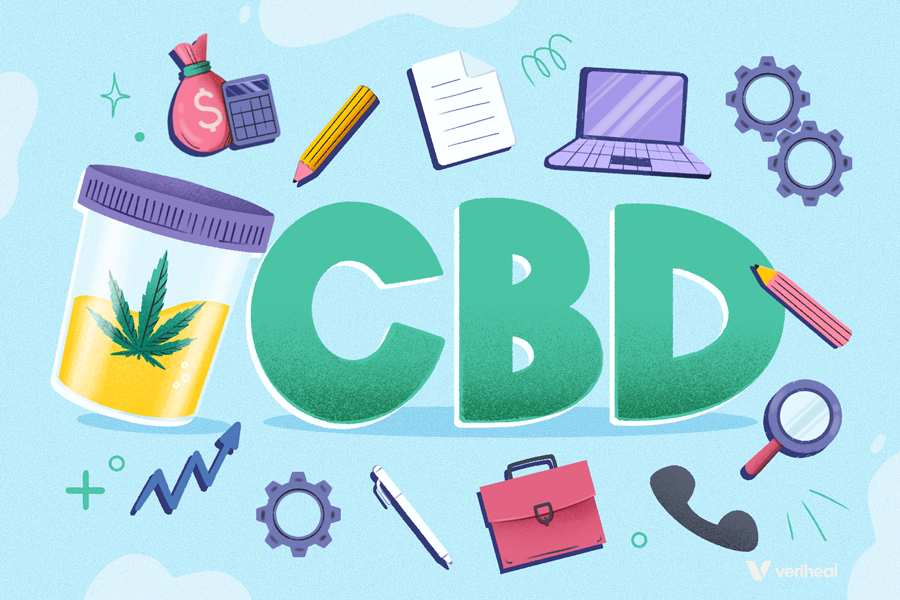Although CBD may be legal in your jurisdiction and allowed at your workplace, it can cost you your job. Understanding whether CBD in the workplace is acceptable is essential to navigating the professional realm.
CBD products are everywhere and in different forms—chocolates, gummies, oils, lotions, beverages, concentrates, and even smokable buds. Depending on the regulations in your jurisdiction, you can find these options in grocery stores, farmers’ markets, cannabis dispensaries, convenience stores, and e-shops.
As the compound and its infused products gain widespread acceptance across the US and the world at large, there are rising questions about its acceptance in work environments.
- Is CBD accepted in the US work environment?
- Can I possibly get fired at work for using CBD?
- Can it ruin my drug screening?
For employees currently using CBD or about to explore the compound for one or more of its potential benefits, this article explores:
- What the US laws say about CBD in the workplace
- A real-life example of an employee who got laid off after administering a CBD-infused OTC
- How to play it safe with your CBD doses as an employee
CBD and THC in the U.S.
While CBD in the workplace isn’t always acceptable, CBD has arguably become the most accepted cannabinoid across the United States. One of CBD’s biggest breakthroughs was the famous 2018 Farm Bill which decriminalized hemp-sourced CBD extract—with not more than .3% THC, a concentration too petite to get you stoned.
Another big win was earlier in the same year, 2018, when a CBD-infused drug, Epidiolex, eventually got the FDA’s nod as the first ever and most effective pharmaceutical prescription drug for two severe forms of epileptic seizures in kids—Dravet Syndrome and Lennox-Gastaut.
So, while CBD products are legal and have gained widespread acceptance, particularly in modern healthcare, THC, CBD’s close relative, is still classified as a Schedule I substance. According to the Controlled Substance Act, items listed as Schedule 1 substances are considered harmful, have high addiction risk, and zero medical value.
This explains why although THC and CBD are the most abundant compounds in weed, CBD is particularly favored by US federal and state laws and medicine.
In fact, THC is the chief ‘villain’ most dope screenings target, and based on your jurisdiction and organization’s drug use policy, this psychoactive compound can easily ruin your employment opportunities.
Your safest bet may be CBD isolate—CBD-only extract that contains as high as 99+% CBD concentration, without THC and other extra bodies. Quality isolates are safe and widely accepted in work environments.
Why Do CBD Consumers Fail Drug Tests?
Though it is largely federally accepted, using CBD in the workplace can cause users to fail drug tests. These failed tests are mostly caused by misleading labels of phony products.
For clarity, CBD comes in three major forms:
- Full-spectrum CBD
- Broad-spectrum CBD
- CBD Isolate
Full-spectrum CBD products contain all compounds in cannabis, including THC. Products labeled full-spectrum will likely get you in trouble at work. Completely avoid them if your workplace is a no-THC zone.
Broad-spectrum CBD products should be safer—they may contain all other chemical elements in cannabis, except THC.
CBD Isolate products are your safest bet and most recommended if you anticipate a drug test. As mentioned earlier, they contain only CBD and no other cannabis compounds.
Sadly, many of these products with broad-spectrum CBD and CBD Isolate labels contain unreported amounts of THC, even when the labels claim “THC-free.”
Your supposed zero-THC, hemp-sourced CBD oil (as claimed by many labels) may actually contain significant levels of other hidden compounds that sneak into the product during extraction and are omitted from the ingredient list on the product label.
For instance, in the research conducted by Johns Hopkins, a renowned research institute, only 21 out of 105 products surveyed had accurate labeling. Fifty-two products had more CBD than stated on the label, while 16 had overstated CBD content. Four products with “THC-free” labels contained significant THC levels.
If you fall victim to such products with misleading labels, over time, the trace amounts of THC in these solutions build up and lodge in your adipose tissue for a long time before being released into the bloodstream.
Why You Should Get Your Medical Marijuana Card
Veriheal has satisfied millions of patients nationwide by giving them access to these benefits
- Larger purchase limits
- Peace of mind
- Enhanced legal protection
- Access to higher potency strains
- Save up to 25% on cannabis purchases
- Skip the line at the dispensary
How long drug tests detect these trace amounts of THC in the bloodstream after your last dose varies based on the amount of THC ingested, dosage frequency, and usage history.
CBD in the Workplace Legislation: Lehenky v. Toshiba
There is lingering uncertainty over CBD in the workplace, a potential source of conflict between workers and employees.
For an example, let’s review a recent judgment by the US District Court for the Eastern District of Pennsylvania addressing CBD use and the Americans with Disability Act, ADA, in a case Lehenky v. Toshiba America Energy Systems Corporation, No, 22-1475 (3rd DCA May 19, 2023).
In its judgment, the Third Circuit Court of Appeals upheld the dismissal of a lawsuit filed by a former Toshiba employee named Lehenky, who alleged unjust employment termination for testing positive for THC, an ingredient of a product she used to manage her disability.
The court concluded that the company’s drug use policy was not discriminatory towards individuals with disabilities as alleged but for all workers.
In the Lehenky-Toshiba suit, the employer (Toshiba) had an active drug-free workplace policy against THC usage as well as misuse of OTC and prescription drugs. To use hemp, employees must report their prescribed drugs and doses via proper documentation—otherwise, detected drug use is punishable by a disciplinary action deemed suitable by the company.
In an impromptu drug screening exercise at the company, those who tested positive were considered policy violators and laid off—including Lehenky.
Lehenky had been Toshiba’s staff for 18 years and switched to a work-from-home schedule in 2014.
In 2018, she began dosing a hemp-sourced CBD oil to manage the pains and discomforting symptoms of an inflammatory autoimmune disease she was diagnosed with. Although she claimed to have a doctor’s approval, her employers were unaware of her CBD doses and the doctor’s consent.
During a 2019 drug screening, Lehenky was picked for a random drug test, of which she came out dirty and was laid off immediately. She filed a suit against her hirer for breach of the ADA, which the Court Circuit dismissed.
The court ruled that since she tested positive for THC, a substance prohibited by Toshiba’s policy, her fate hung on the company’s disciplinary decisions and that the company had in no way discriminated against Lehenky’s disability.
Play It Safe While Using CBD in the Workplace
Trust your source—do not buy from vendors without industry reputation or track record. By buying from trusted vendors, you’re double sure of your product’s quality and content.
Request a Certificate of Analysis (CoA)—CoA is a third-party lab test result that reveals all the ingredients in a CBD product and individual concentrations. If you find any discrepancies between the COA and the claim on the product label, something may be fishy–check another product.
Discuss with your doctor before dosing—Even with its increasing acceptability, CBD is still a drug with side effects and likely drug-drug interaction. So, more professional medical recommendations will come in handy.
Inform your employers—If you’ll be using CBD, ensure your hirers are well informed before you begin. This way, you’ll be protected if anything comes up, as in Lehenky’s case. It’s always best to know the company’s stance on cannabis use from day one. Also ask which compound is prohibited, if any.
Whenever you can use CBD-infused topicals for your condition, prefer them over ingestible products, as external applications (even with THC) will not appear in your drug test.
For instance, prefer CBD lotions over vaping CBD concentrates if you seek an efficient solution for your inflammation joint.
Many employers uphold strict drug policies. While certain states have recently enacted laws preventing employers from penalizing employees who use cannabis outside of work, the case of Lehenky demonstrates that, on a federal level, employers can determine what’s acceptable and what’s not and take disciplinary actions against erring employees.
If an employer discovers an employee uses a THC-containing product at the time of termination, based on their company policy, they are legally protected under the ADA to discipline, terminate, or decline to rehire that employee, regardless of the product’s legality federally.
Author, Share & Comments
















